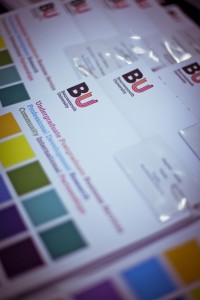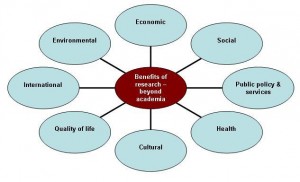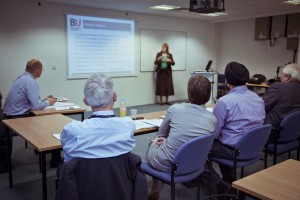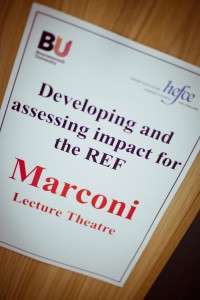 Last Friday BU held an internal Research Impact event to share the success of the excellent research that has been undertaken by BU academics. The focus of the event was on how this research has had an impact outside of academia, for example an impact on society, the economy, quality of life, culture, policy, etc.
Last Friday BU held an internal Research Impact event to share the success of the excellent research that has been undertaken by BU academics. The focus of the event was on how this research has had an impact outside of academia, for example an impact on society, the economy, quality of life, culture, policy, etc.

 For the forthcoming REF2014 BU will be required to include a number of research impact case studies as part of the submission. This is a new element to the REF (previously the RAE) and the HE sector has been grappling with the concept of impact for a number of years now.
For the forthcoming REF2014 BU will be required to include a number of research impact case studies as part of the submission. This is a new element to the REF (previously the RAE) and the HE sector has been grappling with the concept of impact for a number of years now.

The event, attended by over 75 BU staff, opened with a presentation from Prof Matthew Bennett (Pro Vice Chancellor – Research, Enterprise and Internationalisation) on BU’s future research strategy, planning for the REF, and how to develop and evidence research impact.
 Part of the presentation focused on the BU Research Themes which are currently being identified and defined through academic consultation via the Research Blog. This is still in the early stages but Matthew presented the ten draft themes that are emerging. You can comment on the emerging themes here.
Part of the presentation focused on the BU Research Themes which are currently being identified and defined through academic consultation via the Research Blog. This is still in the early stages but Matthew presented the ten draft themes that are emerging. You can comment on the emerging themes here.

There were 35 impact case studies presented in total with most units of assessment (UOAs) presenting three case studies. At the end of each presentation members of the audience critiqued the case study and offered advice as to how the strengthen and maximise the impact claim.
 Attendees were encouraged to go to impact case study presentations from different UOAs/Schools to find out about research that is undertaken in different areas of the University. Stronger impact case studies can also be developed with input from different disciplines.
Attendees were encouraged to go to impact case study presentations from different UOAs/Schools to find out about research that is undertaken in different areas of the University. Stronger impact case studies can also be developed with input from different disciplines.
 The event was also attended by key staff from Marketing & Communications who will be working with UOA Leaders to develop and enhance impact case studies between now and the REF submission in autumn 2013.
The event was also attended by key staff from Marketing & Communications who will be working with UOA Leaders to develop and enhance impact case studies between now and the REF submission in autumn 2013.
 There has been much positive feedback received from attendees and we are considering whether this should now be an annual event, celebrating the success of BU research and its benefit to society.
There has been much positive feedback received from attendees and we are considering whether this should now be an annual event, celebrating the success of BU research and its benefit to society.
 Many thanks to all the presenters and attendees, and everyone who supported the event and made it such a success! 😀
Many thanks to all the presenters and attendees, and everyone who supported the event and made it such a success! 😀
We are now seeking feedback on the impact case studies presented. These are all available on the I-drive (I:\CRKT\Public\RDU\REF\REF event May 2011\impact case study presentations). Please could you email your feedback to Anita Somner in the Research Development Unit by Friday 3 June. Anita will then anonymise and collate the feedback and share it with the UOA Leaders.
For further information on impact see the impact pages on the HEFCE website or our previous BU Research Blog posts on impact.
 Last week BU hosted a HEFCE-supported event for universities in the south of England outlining recent changes in how the quality of research in higher education is assessed.
Last week BU hosted a HEFCE-supported event for universities in the south of England outlining recent changes in how the quality of research in higher education is assessed. Professor Peter Taylor-Gooby (University of Kent), Professor Roy Harrison (University of Birmingham), Professor James Goodwin (Age UK), Dr Kathryn Monk (Environment Agency Wales) and Dr Mari Williams (RCUK) presented their experiences of assessing impact case studies in the REF pilot exercise. Professor Jim Griffiths (University of Plymouth) presented his experience of identifying and submitting impact case studies to the pilot exercise in the hope that others would learn from his experience.
Professor Peter Taylor-Gooby (University of Kent), Professor Roy Harrison (University of Birmingham), Professor James Goodwin (Age UK), Dr Kathryn Monk (Environment Agency Wales) and Dr Mari Williams (RCUK) presented their experiences of assessing impact case studies in the REF pilot exercise. Professor Jim Griffiths (University of Plymouth) presented his experience of identifying and submitting impact case studies to the pilot exercise in the hope that others would learn from his experience.

















 BU attendance at third annual GCPHR meeting in June
BU attendance at third annual GCPHR meeting in June Interactive Tangible and Intangible Heritage Applications – BU student work featured in new book chapter
Interactive Tangible and Intangible Heritage Applications – BU student work featured in new book chapter Second NIHR MIHERC meeting in Bournemouth this week
Second NIHR MIHERC meeting in Bournemouth this week MSCA Postdoctoral Fellowships 2025 Call
MSCA Postdoctoral Fellowships 2025 Call ERC Advanced Grant 2025 Webinar
ERC Advanced Grant 2025 Webinar Horizon Europe Work Programme 2025 Published
Horizon Europe Work Programme 2025 Published Horizon Europe 2025 Work Programme pre-Published
Horizon Europe 2025 Work Programme pre-Published Update on UKRO services
Update on UKRO services European research project exploring use of ‘virtual twins’ to better manage metabolic associated fatty liver disease
European research project exploring use of ‘virtual twins’ to better manage metabolic associated fatty liver disease